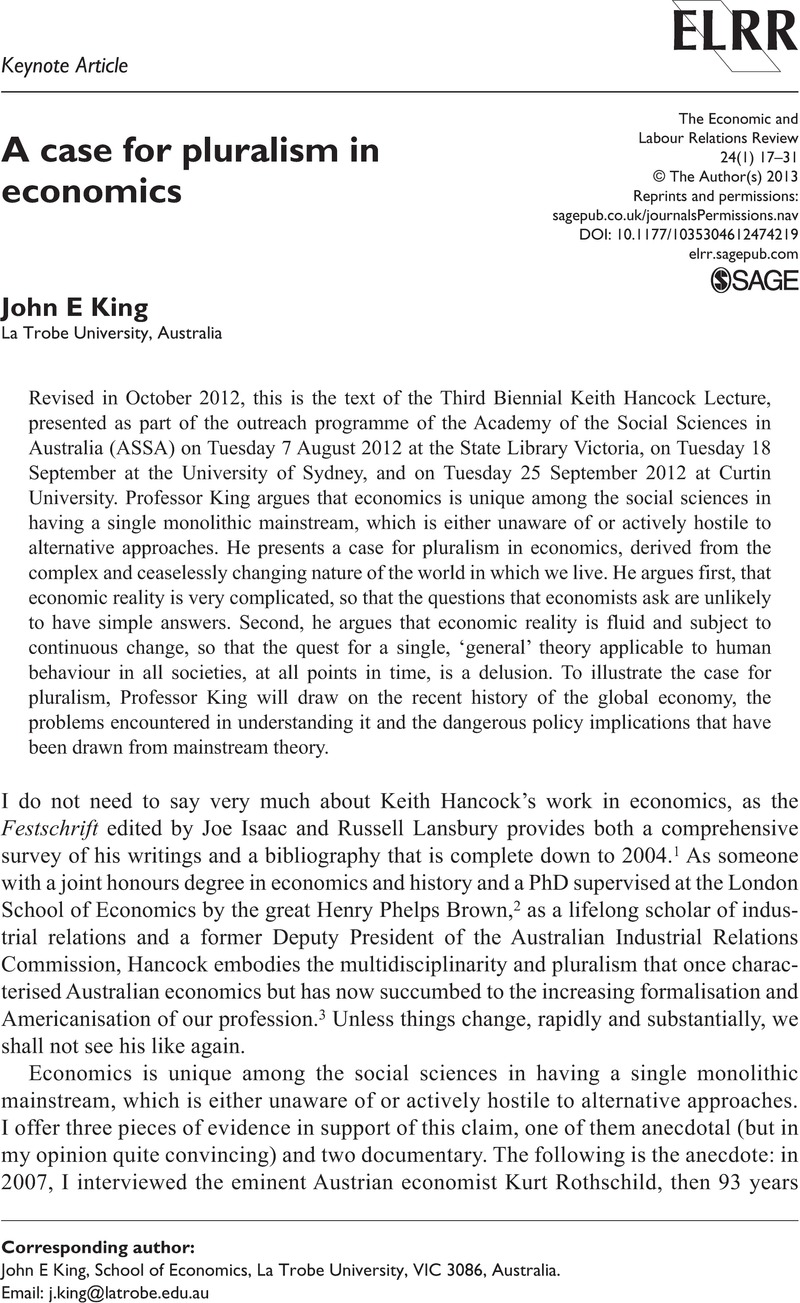Crossref Citations
This article has been cited by the following publications. This list is generated based on data provided by Crossref.
Jefferson, Therese
2014.
Challenging the Orthodoxy.
p.
25.
Pixley, Jocelyn
2018.
Central Banks, Democratic States and Financial Power.
Aistleitner, Matthias
Kapeller, Jakob
and
Steinerberger, Stefan
2018.
Citation Patterns in Economics and Beyond.
SSRN Electronic Journal,
Aistleitner, Matthias
Kapeller, Jakob
and
Steinerberger, Stefan
2019.
Citation patterns in economics and beyond.
Science in Context,
Vol. 32,
Issue. 4,
p.
361.
Stilwell, Frank
2019.
From Economics to Political Economy: Contradictions, Challenge, and Change.
The American Journal of Economics and Sociology,
Vol. 78,
Issue. 1,
p.
35.
Kvangraven, Ingrid
and
Alves, Carolina
2020.
¿Por qué tan hostil? Quebrando mitos sobre la economía heterodoxa.
Ensayos de Economía,
Vol. 30,
Issue. 56,
p.
230.
Crouch, Colin
2021.
Wirtschaft, Gesellschaft und Politik.
p.
11.
Roos, Michael
and
Hoffart, Franziska M.
2021.
Climate Economics.
p.
97.
Kapeller, Jakob
Puehringer, Stephan
and
Grimm, Christian
2022.
Paradigms and policies: the state of economics in the German-speaking countries.
Review of International Political Economy,
Vol. 29,
Issue. 4,
p.
1183.
King, John E.
and
Hawkins, John
2022.
A Conversation with John E. King.
History of Economics Review,
Vol. 82,
Issue. 1,
p.
45.
Adams, Erin C.
2022.
Does a queen belong in a democracy? Departures and possibilities in civics and economics education.
The Journal of Social Studies Research,
Vol. 46,
Issue. 4,
p.
303.
Stilwell, Frank
2023.
The Future for Political Economy: Towards Unity in Diversity?.
Review of Political Economy,
Vol. 35,
Issue. 1,
p.
189.
Fernández-Huerga, Eduardo
Pardo, Ana
and
Salvador, Ana
2023.
Compatibility and complementarity between institutional and post-Keynesian economics: a literature review with a particular focus on methodology.
Economia Politica,
Vol. 40,
Issue. 2,
p.
413.
Lari, Teemu
and
Mäki, Uskali
2024.
Costs and Benefits of Diverse Plurality in Economics.
Philosophy of the Social Sciences,
Vol. 54,
Issue. 5,
p.
412.
Crouch, Colin
2024.
Economy, Society and Politics.
p.
11.
Levi, Hila
2024.
It’s (not only) the economy, stupid: examining the European Central Bank’s marginal attention to the human and social implications of austerity during the euro-area crisis through the lens of organizational culture.
Journal of European Integration,
Vol. 46,
Issue. 8,
p.
1151.
Arcos-Alonso, Asier
Fernandez de la Cuadra-Liesa, Itsaso
Garcia-Azpuru, Amaia
and
Barba Del Horno, Mikel
2024.
Rethinking Economics Education: Student Perceptions of the Social and Solidarity Economy in Higher Education.
Education Sciences,
Vol. 15,
Issue. 1,
p.
27.



